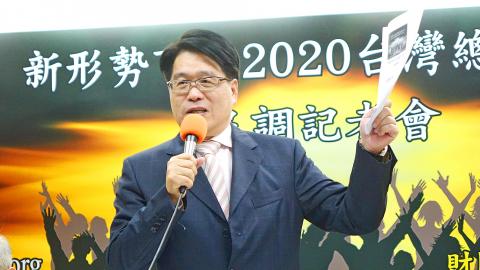President Tsai Ing-wen (蔡英文) would win in a three-way presidential race against independent Taipei Mayor Ko Wen-je (柯文哲) and Kaohsiung Mayor Han Kuo-yu (韓國瑜) or Hon Hai Precision Industry Co founder Terry Gou (郭台銘), who are vying for the Chinese Nationalist Party’s (KMT) nomination, a survey released by the Taiwanese Public Opinion Foundation showed yesterday.
In a race between Tsai, Han and Ko, 36.9 percent of respondents said they would vote for Tsai, while 29.4 percent preferred Han and 27.5 percent chose Ko.
In such scenario, Ko would have an “absolute advantage” with voters under 40, but would be at a disadvantage when it comes to voters aged 55 or older, the survey said.

Photo: George Tsorng, Taipei Times
Han would be more popular among voters aged 45 to 60, and Tsai with those 60 or above, it said.
If the KMT were to nominate Gou, who on Friday resigned as company chairman, Tsai would still win next year’s presidential election with 35.5 percent of votes, compared with 28.1 percent for Ko and 26.1 percent for Gou, the poll showed.
Sixty-seven percent of Democratic Progressive Party (DPP) supporters would vote for Tsai, while 54 percent of KMT supporters would vote for Gou, it found.
In addition to having the support of 37 percent of independent voters, Ko would have the support of 32 percent of KMT supporters and 23 percent of DPP supporters, suggesting that if Gou were to represent the KMT, more KMT supporters would vote for Ko, it said.
The foundation also revealed how prospective candidates scored on the “feeling thermometer,” which measures politicians’ popularity.
Ko, Tsai, Gou and Han received average scores of 56.93, 55.16, 49.27 and 43.79 respectively, while former premier William Lai (賴清德), who lost to Tsai in the DPP’s presidential primary, received 58.27.
A score lower than 50 indicates a “cold” public attitude toward the politician, foundation chairman Michael You (游盈隆) said.
The foundation also surveyed the approval rating of the Tsai administration and found that nearly 48 percent of respondents approved of the way Tsai handles national affairs, while 44 percent disapproved.
The finding shows that Tsai’s approval rating, which had been low for a long time, has turned around, the survey said.
The poll also showed that 52 percent of respondents were satisfied with Premier Su Tseng-chang’s (蘇貞昌) performance, while 38 percent were dissatisfied.
Meanwhile, Gou is leading the KMT primary with 29 percent support, compared with former New Taipei City mayor Eric Chu’s (朱立倫) 26.7 percent, Han’s 26.4 percent, former Taipei County commissioner Chou Hsi-wei’s (周錫瑋) 2.3 percent and National Taiwan University political science professor Chang Ya-chung’s (張亞中) 0.5 percent, the survey found.
The poll, conducted on Monday and Tuesday last week, was commissioned by the foundation and conducted nationwide by Focus Survey Research.
It targeted adults over the age of 20 via landlines, collected 1,092 valid samples and had a margin of error of 2.97 percentage points.

Taiwan would welcome the return of Honduras as a diplomatic ally if its next president decides to make such a move, Minister of Foreign Affairs Lin Chia-lung (林佳龍) said yesterday. “Of course, we would welcome Honduras if they want to restore diplomatic ties with Taiwan after their elections,” Lin said at a meeting of the legislature’s Foreign Affairs and National Defense Committee, when asked to comment on statements made by two of the three Honduran presidential candidates during the presidential campaign in the Central American country. Taiwan is paying close attention to the region as a whole in the wake of a

President William Lai (賴清德) has appointed former vice president Chen Chien-jen (陳建仁) to attend the late Pope Francis’ funeral at the Vatican City on Saturday on his behalf, the Ministry of Foreign Affairs said today. The Holy See announced Francis’ funeral would take place on Saturday at 10am in St Peter’s Square. The ministry expressed condolences over Francis’ passing and said that Chen would represent Taiwan at the funeral and offer condolences in person. Taiwan and the Vatican have a long-standing and close diplomatic relationship, the ministry said. Both sides agreed to have Chen represent Taiwan at the funeral, given his Catholic identity and

Chinese Nationalist Party (KMT) Chairman Eric Chu (朱立倫), spokeswoman Yang Chih-yu (楊智伃) and Legislator Hsieh Lung-chieh (謝龍介) would be summoned by police for questioning for leading an illegal assembly on Thursday evening last week, Minister of the Interior Liu Shyh-fang (劉世芳) said today. The three KMT officials led an assembly outside the Taipei City Prosecutors’ Office, a restricted area where public assembly is not allowed, protesting the questioning of several KMT staff and searches of KMT headquarters and offices in a recall petition forgery case. Chu, Yang and Hsieh are all suspected of contravening the Assembly and Parade Act (集會遊行法) by holding

Lawmakers from the Democratic Progressive Party (DPP) yesterday established a friendship group with their counterparts in Ukraine to promote parliamentary exchanges between the two countries. A ceremony in Taipei for the Taiwan-Ukraine Parliamentary Friendship Association, initiated by DPP Legislator Chen Kuan-ting (陳冠廷), was attended by lawmakers and officials, including Deputy Minister of Foreign Affairs Francois Wu (吳志中) and European Economic and Trade Office in Taiwan Director Lutz Gullner. The increasingly dire situation in Ukraine is a global concern, and Taiwan cannot turn its back when the latter is in need of help, as the two countries share many common values and interests,